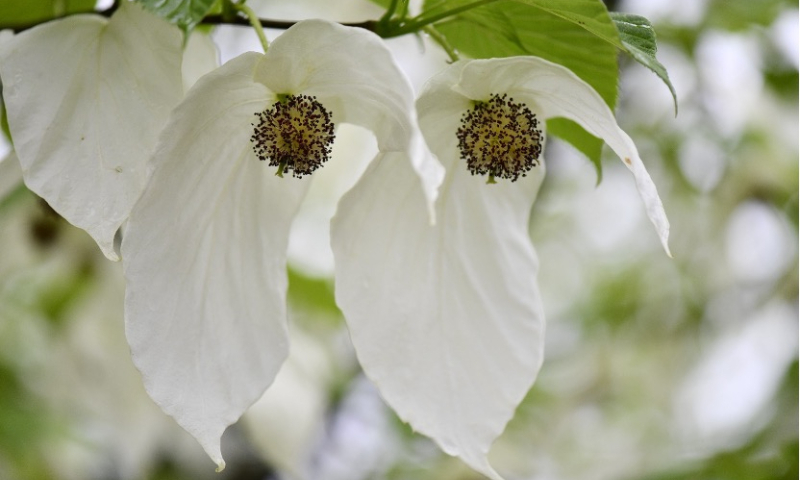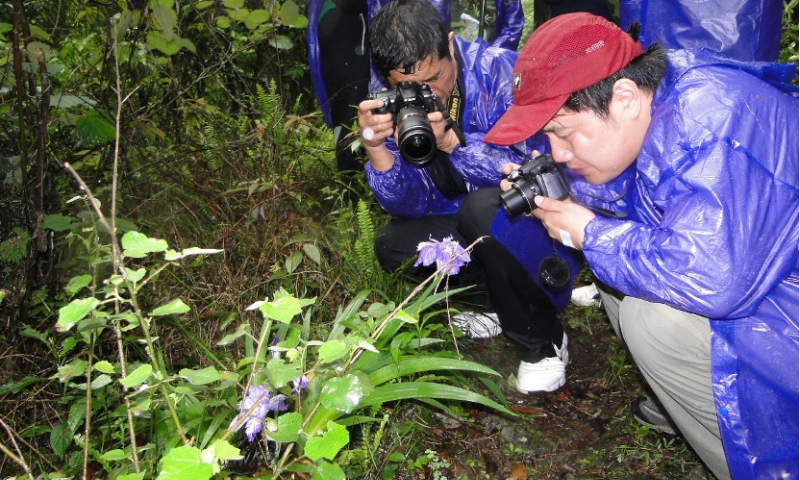SOURCE / PRESS RELEASE
Mount Fanjing in Guizhou: World Natural Heritage Site where man and nature coexist
In March, the foot of the Mount Fanjing turns green, while the peak standing 2,572 meters above sea level is still snowcapped. The dove tree, an internationally recognized "living fossil," just begins its florescence... This region, with its area of 775 square kilometers ranging from mid-subtropical to mid-temperate zones, is home to more than 7,000 species.

Our planet is 4.5 billion years old, so old that man has to read its memories through geological and topographic information. According to a guide at the heritage museum, the Mount Fanjing, mainly a metamorphic rock structure, is an isolated ecosystem, like an island in an ocean of Karst hills, indicating the Wuling mountain range was under the sea 1.4 billion years ago. Such landform is one of a kind in the world.
On July 2, 2018, the Mount Fanjing was inscribed on the List of World Natural Heritages at the 42nd World Heritage Convention (listed as Fanjingshan). It is the fourth World Natural Heritage site in Guizhou, following South China Karst in Libo, China Danxia in Chishui, and Yuntai Mountain (listed as Yuntaishan) in Shibing, making Guizhou the province with the most World Natural Heritage sites in China. "There are 24,547 identified species living in Guizhou so far, ranking fourth in China or the first in terms of unit density," said Ran Jingcheng, president of the Guizhou Academy of Forestry, adding that "great wisdom" is needed in eco-conservation, a job demanding careful planning for protected areas, mobilizing the local communities, and considering both natural protection and community development. The Mount Fanjing National Nature Reserve has set a good example by developing an administrative system of its own.

The Tuanlong Village in the Yinjiang Autonomous County is the only state-listed entire village maintaining minority features in the Fanjingshan Pilot Zone. The government led the relocation of villagers in the core area in 2018 in different areas, and the villagers in the pilot zone stayed in the mountain. It was then when Chai Enxiong, a villager, gave up his hunting life and started planting tea. He now also collects withered timber from the mountain and sells them as souvenirs.
According to Ran Jingcheng, the highway ring around the mountain inserts artificial biological barriers to the local ecosystem. This "Eco-corridor" is very important for the protection of environment-sensitive wildlife, including habitat restoration, human behavior administration, water source protection, and food supply restoration. Yang Quanyong, head of the Hekou Station of the Mount Fanjing National Nature Reserve Administration, and his 130 rangers are now "eco-defenders." Each of them spends eight hours patrolling the mountain area every day. The total distance they've collectively walked in 30 years equals the circumference of the Earth equator. Guizhou's efforts as one of the first state-level ecological civilization pilot zones reported good results, with 30 reform achievements in 13 areas listed in 2020 and recommended for ecosystem reform practices of China's national ecological civilization pilot zones.

Today's Mount Fanjing aims to become a National Park. According to Shang Kong, director of Fanjingshan National Nature Reserve Administration, the future "Fanjingshan National Park" will be becoming the most strictly administrated nature reserve in the world and its ecosystems will be given higher priority.
Improving ecology boosts local economic development. In the past decade, Guizhou has achieved impressive development. Its GDP growth rate has been one of the highest in the country for 10 consecutive years, with its total economic volume reaching 2.02 trillion yuan in 2022, doubling that of 2012. Its forest coverage rate hit 62%, up 15 percentage points over 2012, the water quality is 100% good at major rivers' boundary sections and the contribution of green economy to the GDP is over 45%.

Dove tree of China is honored as "living fossil" by botanists. Photo: IC
Our planet is 4.5 billion years old, so old that man has to read its memories through geological and topographic information. According to a guide at the heritage museum, the Mount Fanjing, mainly a metamorphic rock structure, is an isolated ecosystem, like an island in an ocean of Karst hills, indicating the Wuling mountain range was under the sea 1.4 billion years ago. Such landform is one of a kind in the world.
On July 2, 2018, the Mount Fanjing was inscribed on the List of World Natural Heritages at the 42nd World Heritage Convention (listed as Fanjingshan). It is the fourth World Natural Heritage site in Guizhou, following South China Karst in Libo, China Danxia in Chishui, and Yuntai Mountain (listed as Yuntaishan) in Shibing, making Guizhou the province with the most World Natural Heritage sites in China. "There are 24,547 identified species living in Guizhou so far, ranking fourth in China or the first in terms of unit density," said Ran Jingcheng, president of the Guizhou Academy of Forestry, adding that "great wisdom" is needed in eco-conservation, a job demanding careful planning for protected areas, mobilizing the local communities, and considering both natural protection and community development. The Mount Fanjing National Nature Reserve has set a good example by developing an administrative system of its own.

Mount Fanjing, a World Natural Heritage Site Photo: www.huanqiu.com
The Tuanlong Village in the Yinjiang Autonomous County is the only state-listed entire village maintaining minority features in the Fanjingshan Pilot Zone. The government led the relocation of villagers in the core area in 2018 in different areas, and the villagers in the pilot zone stayed in the mountain. It was then when Chai Enxiong, a villager, gave up his hunting life and started planting tea. He now also collects withered timber from the mountain and sells them as souvenirs.
According to Ran Jingcheng, the highway ring around the mountain inserts artificial biological barriers to the local ecosystem. This "Eco-corridor" is very important for the protection of environment-sensitive wildlife, including habitat restoration, human behavior administration, water source protection, and food supply restoration. Yang Quanyong, head of the Hekou Station of the Mount Fanjing National Nature Reserve Administration, and his 130 rangers are now "eco-defenders." Each of them spends eight hours patrolling the mountain area every day. The total distance they've collectively walked in 30 years equals the circumference of the Earth equator. Guizhou's efforts as one of the first state-level ecological civilization pilot zones reported good results, with 30 reform achievements in 13 areas listed in 2020 and recommended for ecosystem reform practices of China's national ecological civilization pilot zones.

A survey in the rain Photo: Courtesy of Ran Jingcheng
Today's Mount Fanjing aims to become a National Park. According to Shang Kong, director of Fanjingshan National Nature Reserve Administration, the future "Fanjingshan National Park" will be becoming the most strictly administrated nature reserve in the world and its ecosystems will be given higher priority.
Improving ecology boosts local economic development. In the past decade, Guizhou has achieved impressive development. Its GDP growth rate has been one of the highest in the country for 10 consecutive years, with its total economic volume reaching 2.02 trillion yuan in 2022, doubling that of 2012. Its forest coverage rate hit 62%, up 15 percentage points over 2012, the water quality is 100% good at major rivers' boundary sections and the contribution of green economy to the GDP is over 45%.
